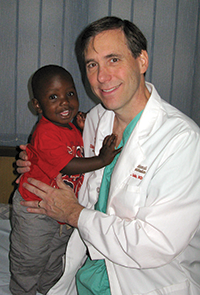
Dr. Craig Sable began his work in Uganda in 2003, focusing on improving providers’ ability to diagnose RHD and take care of their patients. He began with efforts to expand the Ugandan Heart Institute’s surgical capacity to provide the life-saving operations necessary for curing heart valve defects caused by RHD and CHD. Dr. Sable recalls some initial skepticism at the effort, but eventually “our partner in Uganda agreed that the program would lead to an improved infrastructure, more effective implementation, and educational and training improvements.” After four years of consistent visits and development, the team at UHI performed their first open heart surgery in 2007. That year, Dr. Sable met with the president of Uganda, and through a clear demonstration of the team’s accomplishments so far, was able to cement a local commitment to the project and sustained improvements to both UHI and the regional referral network. At the same time, Dr. Sable established support and planning for the development of a cardiac catheterization lab at UHI.
In 2012, the project gained a game-changing addition: Dr. Andrea Beaton. “When (Dr. Beaton) joined with her capacity for research and treatment, it created an additional level of legitimacy not only on the Uganda front, but also on the whole African stage by bringing additional resources critical to building the platform and funding additional research,” says Dr. Sable. Their first regional program, run in 2013 in Gulu, brought in an entirely new group of providers and leaders, mostly from rural areas. This was key to implementing a further expansion of access to care. The interest from these providers enabled the team to develop a telemedicine network, connecting rural tertiary care centers to UHI in Mulago, and Mulago to the rest of the world.
From his close to thirty years of experience working in low and middle income countries, Dr. Sable advises “the most important thing is to build trust slowly based on strong personal relationships and frequent visits and communication. It is impossible for anyone to believe your impact if you go to a site once.” Not only does consistent financial and physical support impart faith in the project, it also significantly impacts the sustainability of the venture. Additionally, providing education and training partnerships, which become more profound over time, has considerable implications for long-term growth and expansion. Dr. Sable and his closest partner in Uganda, Dr. Lwabi, have been working together since the beginning of the project to spearhead the development of a system of referral, the implementation of local screening, and the cultivation of a robust diagnostic treatment system. These accomplishments, despite the many challenges Dr. Sable and his colleagues have faced, transformed the healthcare system in Uganda, setting an excellent example of sustainable global outreach that can be replicated internationally. In addition, UHI has gained considerable national support and Uganda has been internationally recognized as “the best place to conduct RHD research,” adds Dr. Sable.
As the project moves forward and the most pressing needs are being met, Dr. Sable describes how Dr. Beaton has been working on providing education about RHD and CHD to the general public and establishing support systems for children and young adults affected by the cardiac disease. “(Dr. Beaton and her team) have developed…a support group and structure so kids can continue to get support from providers, have peer groups, and ensure there is available continued education,” says Dr. Sable. This helps “to make up for the impact of the diagnosis,” which can have negative societal implications. As Dr. Beaton and her Ugandan partner Dr. Okello take on greater responsibility and leadership roles, they are heading the project in a more research-oriented direction. This summer, they are beginning the first phase of a three year undertaking, and expect to screen 45,000 children for RHD via portable ultrasound. The project has been funded through a multimillion dollar grant from the American Heart Association, awarded to Dr. Sable, Dr. Beaton, Dr. James Dale, an infectious diseases specialist at the University of Tennessee, and Dr. David Watkins, a hospitalist and data sciences expert at the University of Washington, Seattle.
View Dr. Sable's Leadership Profile


